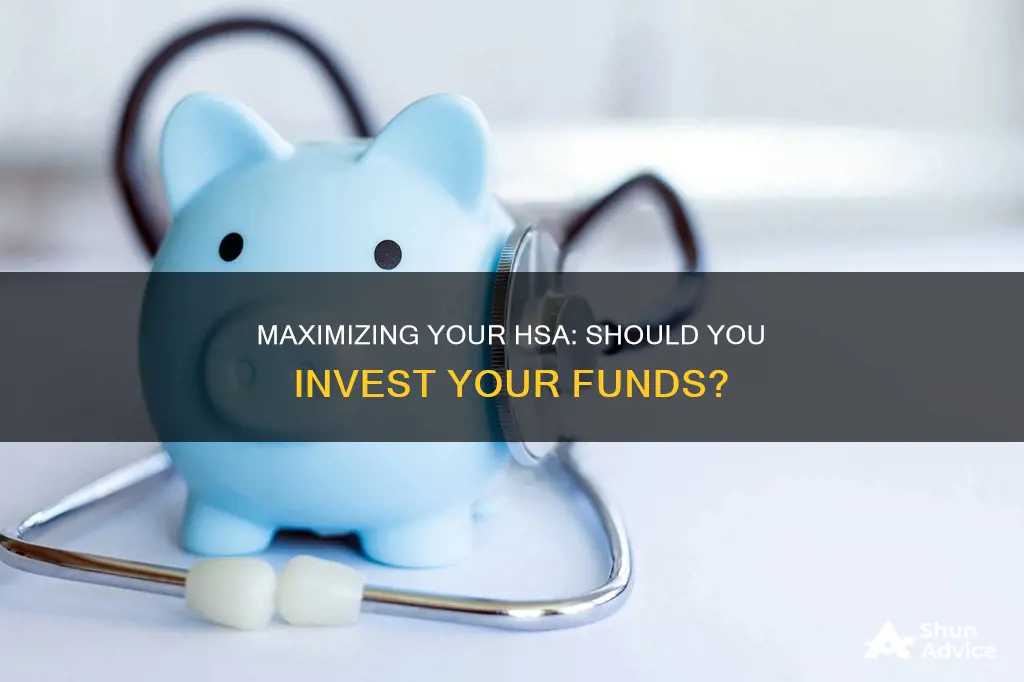
Health savings accounts (HSAs) are a great way to save for future medical expenses and offer triple tax benefits. Contributions are tax-deductible, earnings are tax-free, and withdrawals for qualified medical expenses are also tax-free. While you can keep your HSA funds in cash, investing them can help them grow faster. You can invest in stocks, bonds, mutual funds, ETFs, and more, depending on your HSA provider and your preferences. However, it's important to keep in mind that investing comes with risks, and you should consider your unique circumstances, risk tolerance, and potential future medical needs before deciding how to invest your HSA funds.
| Characteristics | Values |
|---|---|
| Tax advantages | Contributions are tax-deductible, earnings are tax-free, and withdrawals are tax-free when used for qualified medical expenses |
| Investment options | Stocks, bonds, mutual funds, ETFs, dividend funds, individual stocks, robo-advisors |
| Minimum cash balance | Most HSAs require a minimum cash balance before you can open an investment account |
| Catch-up contributions | Individuals aged 55 or older can contribute an additional $1,000 as a catch-up contribution |
| Withdrawal penalties | Non-qualified withdrawals made prior to age 65 are subject to ordinary income tax plus a 20% early withdrawal penalty |
| State taxes | HSA contributions, earnings, and qualified distributions may be subject to state taxes |
| Maximum contributions | $4,150 for individuals, $8,300 for families in 2024 |
| Rollover | HSA funds can be rolled over from year to year and are not subject to required minimum distributions |
What You'll Learn

HSA funds can be invested in stocks
Health Savings Accounts (HSAs) are a great way to save for future health-related expenses. But did you know that you can also invest your HSA funds in stocks?
Investing your HSA funds can be a great way to make the most of your savings and potentially grow your funds tax-free. HSAs are known for their triple tax advantages: contributions are tax-deductible, earnings are tax-free, and withdrawals for qualified medical expenses are not taxed. While HSA contributions and earnings are generally exempt from federal income tax, they may still be subject to state taxes in whole or in part.
When it comes to investing your HSA funds, you have a few options. Some HSAs offer tools to help you choose your investments and provide automatic rebalancing to maintain your preferred allocation. Other HSAs allow you to select specific investments, including stocks, bonds, mutual funds, and ETFs.
It's important to note that if your HSA is offered through an employer, you may have more limited options for investing your funds. Additionally, most HSAs require you to maintain a minimum cash balance before you can open an investment account. This means that you'll need to have sufficient funds to meet the minimum balance requirement and cover any potential health care costs before you can start investing.
By investing your HSA funds, you can take advantage of the account's triple tax benefits and potentially grow your savings faster than with saving alone. This can be especially beneficial if you're investing for the long term and want to maximize your returns.
Remember, investing comes with risks, and the value of your investments can fluctuate. It's always a good idea to consult with a financial advisor to understand the risks and potential rewards of investing your HSA funds in stocks and to ensure that it aligns with your financial goals and risk tolerance.
Bridgewater Associates: Investing in the Premier Hedge Fund
You may want to see also

HSA funds can be used to pay for current medical expenses
A Health Savings Account (HSA) is a tax-exempt trust or custodial account that allows you to set aside money on a pre-tax basis to pay for qualified medical expenses. HSA funds can be used to pay for current medical expenses, including deductibles, copayments, and coinsurance. Here are some key points to consider:
- Tax Advantages: HSA contributions are tax-deductible, earnings are tax-free, and withdrawals for qualified medical expenses are tax-free. This provides a triple tax advantage for account holders. However, HSA funds used for non-qualified expenses before the age of 65 will be subject to ordinary income tax and an early withdrawal penalty.
- Eligibility: To contribute to an HSA, you must be enrolled in a High Deductible Health Plan (HDHP). This is typically a health plan with higher annual deductibles and out-of-pocket medical expense limits. You must also meet certain eligibility requirements, such as not being enrolled in Medicare and not being claimed as a dependent on someone else's tax return.
- Investment Opportunities: While HSA funds can be used to pay for current medical expenses, you can also invest a portion of your HSA funds to potentially grow your savings tax-free. This strategy is recommended by some financial advisors, as it allows you to take advantage of the tax benefits of HSAs while also preparing for future healthcare costs, which are expected to increase over time.
- Record-Keeping: It is important to maintain proper records of your HSA transactions. Keep track of your medical expenses, receipts, and documentation to ensure that you can provide proof of qualified medical expenses if needed.
- Rollovers and Transfers: HSA funds can be rolled over from one HSA to another without any tax implications. Additionally, you can transfer funds from certain types of retirement accounts, such as traditional IRAs, into your HSA.
- Provider Options: Banks, credit unions, and other financial institutions offer HSAs. It is important to compare different providers and consider factors such as fees, investment options, and customer service when choosing an HSA provider.
Christians Investing in Mutual Funds: Is It Ethical?
You may want to see also

HSA funds can be used to pay for future medical expenses
HSAs are a great way to save for future medical expenses. They are a type of savings account that lets you set aside money on a pre-tax basis to pay for qualified medical expenses. By using untaxed dollars in an HSA to pay for deductibles, copayments, coinsurance, and some other expenses, you may be able to lower your out-of-pocket health care costs.
HSA funds can be used to pay for a variety of medical expenses, including:
- Coinsurance: a percentage of the cost that you pay for each plan-covered service, like 20%.
- Copayment: a fixed amount you pay for a plan-covered service, like $30.
- Deductible: the amount you pay for certain covered services and items each year before your plan starts to pay (except for free preventive services).
- Qualified medical expenses: these include some dental, drug, and vision expenses. A full list of qualifying medical and dental expenses can be found on IRS.gov Publication 502 (PDF).
It's important to note that HSA funds generally may not be used to pay premiums. Additionally, to contribute to an HSA, you must have an HSA-eligible plan, also called a High Deductible Health Plan (HDHP). These plans typically only cover preventive services before the deductible.
HSA funds can be a great way to prepare for future medical expenses, especially considering the likelihood that healthcare costs will continue to rise. By contributing to an HSA and taking advantage of its tax benefits, you can help ensure that you have the funds you need when unexpected medical costs arise.
Smaller Companies, Bigger Returns: Franklin India Smaller Companies Fund
You may want to see also

HSA funds can be invested in mutual funds
A health savings account (HSA) is a tax-efficient way to save for future medical expenses. HSAs offer a triple tax benefit: contributions are tax-deductible, earnings are tax-free, and withdrawals are tax-free when used for qualified medical expenses.
You can invest your HSA funds in a variety of ways, including mutual funds. However, some HSA providers require a minimum balance before you can invest your money. This is typically around $2,000, but it's important to check with your provider.
If you have a relatively small balance in your HSA or plan to use the funds regularly, it may be best to choose low-risk, low-return options such as money market funds. This ensures that your money will be readily available when needed.
On the other hand, if you don't anticipate significant medical expenses in the coming years, investing in stocks may be a good option. Stocks offer the potential for higher returns but come with greater risk.
Mutual funds are a popular choice for HSA investment and can provide diversification and automatic dividend reinvestment. However, it's important to note that many mutual funds underperform the overall market, and there may be annual fees and potential sales commission charges.
When investing your HSA funds, it's essential to consider your risk tolerance, investment horizon, and future medical needs. If you have a long time horizon and a high-risk tolerance, more aggressive investments like stocks or mutual funds may be suitable. On the other hand, if you're closer to retirement or have higher medical expenses, less volatile options like bonds or dividend stocks may be preferable.
Remember, the key to maximising the benefits of your HSA is to invest strategically while ensuring you have enough cash to cover qualified medical expenses.
Invest Wisely: Accessing Dimensional Funds for Long-Term Growth
You may want to see also

HSA funds can be invested in ETFs
Health savings accounts (HSAs) are a great way to save for future medical expenses or boost your retirement funds. They are also a fantastic investment vehicle with triple tax benefits.
If you are considering investing your HSA funds, you should be aware that some HSA providers require a minimum balance before you can invest your money. This is typically no more than $2,000.
Once you have met the minimum balance requirement, you can start investing your HSA funds in various options, including exchange-traded funds (ETFs). ETFs are a great way to diversify your investments across a basket of stocks or other assets. They offer automatic dividend reinvestment and typically have low annual fees. Some HSAs even allow ETFs to be purchased with no commissions.
However, it's important to note that not all HSAs are created equal. Some may charge higher fees, and others may not offer the investment options you prefer. It's always a good idea to research and compare different HSA providers to find the one that best suits your needs.
Investing your HSA funds in ETFs can be a strategic way to boost your savings and take advantage of the tax benefits that HSAs offer.
Understanding Investment Funds: What Are They?
You may want to see also
Frequently asked questions
Health savings accounts (HSAs) have a triple tax advantage: contributions are tax-deductible, earnings are tax-free, and withdrawals are tax-free when used for qualified medical expenses.
You can invest HSA dollars the same way you would an individual retirement account (or other investment account). Some HSAs offer tools that help you choose your investments and provide automatic rebalancing, while others allow you to select from specific investments, such as stocks, bonds, mutual funds and ETFs.
This depends on your unique circumstances, including your risk tolerance and potential future medical needs. If you’re using an HSA mainly as a retirement account, then it could make sense to opt for high-return investments. Some options include index funds, dividend funds, and individual stocks. If you have a lower risk tolerance or think you might need money for future medical expenses, it’s best to focus on investments with less risk, such as short-term bond funds or money market funds.
Once you reach age 65, money in your HSA can be withdrawn and used for any reason. However, if it’s used for non-qualified expenses, you’ll be required to pay ordinary income tax on the withdrawal. You can also continue to use your HSA funds to pay for qualified medical expenses tax-free.







